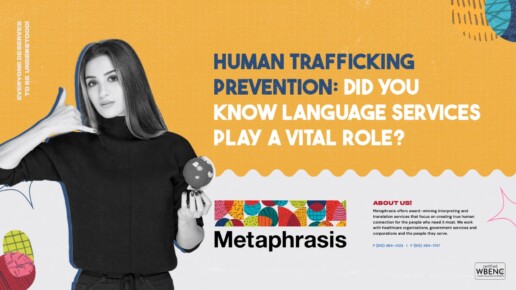Human Trafficking Prevention: Did You Know Language Services Play a Vital Role?
Introduction
Human trafficking is a global crisis affecting millions of people, with victims often trapped in forced labor, sexual exploitation, and other forms of modern slavery. While law enforcement, government agencies, and non-profits play crucial roles in prevention and victim assistance, one often-overlooked factor in combating human trafficking is language services.
Language barriers can prevent victims from seeking help, understanding their rights, or communicating with authorities. This is where interpreters, translators, and multilingual resources become vital in identifying victims, facilitating legal support, and enabling survivors to reclaim their freedom.
In this blog, we’ll explore the essential role of language services in human trafficking prevention and how organizations like Metaphrasis are making a difference.
Understanding Human Trafficking: A Silent Epidemic
Before diving into the role of language services, it’s crucial to understand the depth of the human trafficking crisis.
What is Human Trafficking?
Human trafficking involves the recruitment, transportation, or harboring of individuals through force, fraud, or coercion for exploitation. It often takes the form of:
- Sex trafficking – Victims are forced into prostitution or other sexual activities.
- Labor trafficking – Individuals are coerced into forced labor in industries like agriculture, domestic work, or manufacturing.
- Child trafficking – Minors are exploited for labor, sexual purposes, or other illegal activities.
Why is Human Trafficking Hard to Detect?
- Victims fear retaliation or legal consequences.
- They are often isolated from society, unable to communicate with others.
- Many victims don’t speak the language of the country they are in, making it difficult to seek help.
This is where language services come into play—ensuring that victims have a voice and can access critical resources.
The Connection between Language Barriers and Human Trafficking
How Language Barriers Trap Victims
Traffickers often exploit language barriers to maintain control over their victims. Here’s how:
- Isolation: Victims who cannot communicate effectively are less likely to seek help.
- Misinformation: Traffickers provide false information about laws, making victims believe they have no rights.
- Fear and intimidation: Without access to interpreters, victims may fear deportation or legal trouble if they approach authorities.
Language barriers make it difficult for victims to navigate legal systems, access healthcare, or even communicate with potential allies who could help them escape.
How Language Services Help Prevent Human Trafficking
- Identifying Victims Early
- Healthcare professionals, law enforcement, and social workers use interpreters to communicate with non-English-speaking individuals.
- Multilingual resources help victims recognize warning signs and seek assistance.
- Interpreters enable anonymous helplines to be accessible to all languages.
- Assisting Victims in Legal Proceedings
- Victims often need to testify against traffickers or file legal complaints. Without accurate translation, their cases may be dismissed.
- Legal interpreters ensure that victims understand their rights and can participate in legal processes effectively.
- Helping Survivors Reintegrate into Society
- Language services assist survivors in accessing counseling, medical care, and employment opportunities.
- Bilingual caseworkers provide support networks to help survivors rebuild their lives.
The Role of Metaphrasis in Human Trafficking Prevention
Metaphrasis, a leading language services provider, plays a crucial role in breaking down communication barriers for human trafficking victims. Here’s how:
- Providing Certified Interpreters for Victims
Metaphrasis offers trained interpreters who understand the sensitivity and urgency of trafficking cases. Their professionals work with:
- Law enforcement during victim rescues.
- Non-profits and shelters to provide language assistance.
- Healthcare providers to help victims receive medical attention.
- Offering Multilingual Resources and Awareness Campaigns
Metaphrasis creates translated materials and guides in multiple languages, ensuring that at-risk individuals can:
- Recognize signs of trafficking.
- Know where to seek help.
- Understand their legal rights.
- Training Law Enforcement and Organizations
Metaphrasis educates law enforcement, social workers, and frontline responders on how to communicate with non-English-speaking victims. Their training programs include:
- Trauma-informed interpretation techniques.
- Cultural competency workshops for better understanding of victim backgrounds.
How You Can Help
- Support Language Access Initiatives
- Advocate for multilingual services in government agencies and non-profits.
- Encourage businesses to provide interpretation services for immigrant communities.
- Volunteer or Donate to Organizations Like Metaphrasis
- Many organizations need funding to train interpreters and create multilingual materials.
- Consider donating to language service providers working in human trafficking prevention.
- Educate Your Community
- Share multilingual resources on human trafficking prevention.
- If you’re bilingual, consider volunteering as an interpreter for crisis hotlines.
Conclusion
Language barriers should never be a reason for human trafficking victims to remain trapped. Language services are a powerful tool in identifying, rescuing, and rehabilitating victims, ensuring they can communicate, understand their rights, and access the help they need.
Organizations like Metaphrasis are leading the charge in breaking communication barriers, but we all have a role to play. Whether through advocacy, education, or direct support, we can help create a world where language is no longer a barrier to freedom.

